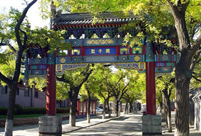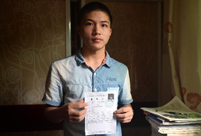 Global ambassadors of ecotourism gather in Nanjing
Global ambassadors of ecotourism gather in Nanjing
 Taiwan woman marries into Kazak family, 100 sheep plus a flat as dowry
Taiwan woman marries into Kazak family, 100 sheep plus a flat as dowry
 College girls take graduation photos under water in Chongqing
College girls take graduation photos under water in Chongqing
 Cartoon: Xi and football
Cartoon: Xi and football
 Chinese influence sweeps ROK
Chinese influence sweeps ROK
 Post-90s beauty boxer grapples four men
Post-90s beauty boxer grapples four men
 3,000-year-old tea town through lenses
3,000-year-old tea town through lenses
 22 archaeological sites along Silk Road in China
22 archaeological sites along Silk Road in China
 Football babies, Samba dancers embrace 'World Cup'
Football babies, Samba dancers embrace 'World Cup'
 Beautiful scenery along China’s Grand Canal
Beautiful scenery along China’s Grand Canal
China's top prosecuting department investigated seven ministerial-level officials in the first five months of this year, an increase of 40 percent compared with the same period in 2013, according to the Supreme People's Procuratorate on Friday.
The officials include Guo Youming, former vice-governor of Hubei province, who is alleged to have taken bribes; Chen Baihuai, former deputy head of Hubei province's top political advisory body, who was suspected of abuse of power and accepting bribes; and Chen Anzhong, former deputy head of Jiangxi province's People's Congress, who is also suspected of bribery.
In addition, 1,577 officials above county level were investigated from January to May by prosecuting departments, up 33.1 percent from the previous year, according to statistics released by the SPP.
Ordinarily, when signs of corruption are discovered, the anti-graft authority will conduct a preliminary investigation. After collecting evidence it deems sufficient to support further action, it will transfer the case to the anti-corruption department under the SPP for further investigation and, if warranted, prosecution.
"Graft crimes tend to be grouped, field centralized, and regional," said Xu Jinhui, director of the anti-corruption and bribery bureau of the SPP.
He said bribery cases have seen a sharp rise, with the amount of money involved ranging from 10 million to 100 million yuan ($1.6 million to $16.1 million).
"Apart from fields such as engineering, land approval or real estate, some senior corrupt officials from State monopoly industries, including railways, electricity, petroleum and telecommunications have abused their power to help enterprises seeking illegal benefits, and accepted huge bribes," he added.
In addition, public involvement and social supervision are playing an active role, and prosecutors have been collecting valuable corruption clues from public reports, he said.
Xu said national prosecutors will place emphasis on State monopoly industries, including electricity, petroleum, minerals and telecommunications, while intensifying supervision of other key investment areas, such as water conservation, environmental protection, new energy and financial sectors.
Meanwhile, anti-graft authorities will pay more attention to the promotion of officials, and intensify supervision of the election of legislators and political advisers for government service at each level, he said.
Tian He, a law professor from the Chinese Academy of Social Sciences, said the central government has used legal means to fight corruption, and the crackdown has been consistent, a clear sign that corrupt officials should not bet on their ability to avoid punishment.
 Featured hutongs in Beijing
Featured hutongs in Beijing Separate college entrance exam
Separate college entrance exam Flash mob dance
Flash mob dance Picturesque scenery of Ghost City
Picturesque scenery of Ghost City Children attend First Writing Ceremony
Children attend First Writing Ceremony Female master poses for graduation photos with son
Female master poses for graduation photos with son Silk Road, China's Grand Canal listed as World Heritage Sites
Silk Road, China's Grand Canal listed as World Heritage Sites PKU students imitate famous paintings in real-person photos
PKU students imitate famous paintings in real-person photos Chinese 'Slumdog Millionaire'
Chinese 'Slumdog Millionaire' Islands in S. China Sea better shown on new vertical atlas of China
Islands in S. China Sea better shown on new vertical atlas of China Girl takes father’s portrait to travel the world
Girl takes father’s portrait to travel the world Images of Xi'an: Part one
Images of Xi'an: Part one In Pictures: Female fans of World Cup
In Pictures: Female fans of World Cup Top 20 hottest women in the world in 2014
Top 20 hottest women in the world in 2014  China's top 10 representative architectures
China's top 10 representative architecturesDay|Week|Month